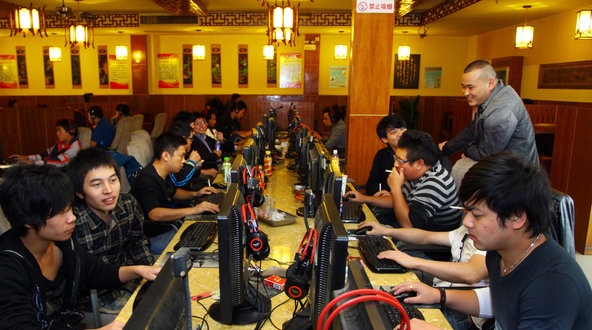 Agence France-Presse — Getty ImagesThe number of Internet users in China is expected to pass 600 million in 2013.
Agence France-Presse — Getty ImagesThe number of Internet users in China is expected to pass 600 million in 2013.
China was on vacation much of last week for the May 1 Worker’s Day holiday, but executives at two of China’s most important online companies were busy completing a deal that could reshape the country’s Internet.
Alibaba, China’s largest e-commerce and online payments firm, announced that it had bought an 18 percent stake in Sina’s Weibo subsidiary for $586 million in a deal expected to jump-start Sina’s revenue through social commerce. Weibo, a microblogging service somewhat akin to Twitter, is one of China’s biggest social networks. Think Amazon or eBay investing in Twitter.
China 中国 Insider
View all posts
China’s top three Internet companies, known as the BATs, are Baidu, Alibaba and Tencent. Baidu, listed on the Nasdaq market, has a market capitalization of just under $30 billion. Alibaba is private but an eventual initial public offering, likely in either the United States or Hong Kong, could make the company one of the most valuable Internet firms in the world. Tencent is listed in Hong Kong and is worth nearly $65 billion, or almost as much as Facebook.
Mobile Internet usage is growing rapidly in China, in large part because of the proliferation of Google’s Android and cheap smartphones made in China. Sunday’s CCTV Evening News dedicated the first three minutes of the broadcast to a report about surging smartphone use and the benefits to China’s economy from the increasing consumption that the mobile Internet is expected to drive.
Weibo’s several hundred million users now access the service more from mobile devices than from PCs. The deal with Sina is part of Alibaba’s strategy, along with other initiatives like developing a new mobile operating system, Alibaba Mobile OS, to become the leading mobile firm in China. According to a report in Monday’s issue of Caixin, one of China’s top business magazines, Baidu was also negotiating with Sina for a Weibo deal. A Baidu representative declined to comment on that claim.
Tencent has its own Weibo service (weibo is the Chinese word for microblogging) as well as WeChat, a mobile messaging and social networking service that has several hundred million registered users. In December, this column cited WeChat as one of the eight trends to keep an eye on in 2013.
All this activity and wealth creation is happening inside of what the Economist magazine, in an excellent recent report on China’s Internet, termed a “giant cage.” But there are recent signs that the government is concerned the cage may need strengthening.
The previous column noted that the government appears to be reining in the more salacious online exposes of corruption that occurred over the last few months in favor of channeling them into official outlets.
On May 2, China’s State Internet Information Office declared war against online rumors because they “have impaired the credibility of online media, disrupted normal communication order, and aroused great aversion among the public.” One report suggests the regulators have some of the most influential users of Sina Weibo, those with millions or tens of millions of followers, in their sights. Online rumors have been a real problem, but crackdowns against them can be used for broader goals.
Last week’s announcement follows a new rule to tighten media controls, especially in regards to Weibo, issued in April, and an essay titled “How Is the Party to Manage the Media Well in the New Era?” by a propaganda official who in 2010 wrote the influential book “The Art of Guiding Public Opinion.”
There have been campaigns against online rumors before. The most concerted efforts to reign in Weibo began after the sixth plenum of the 17th Party Congress in October 2011 when official media declared that “Internet rumors are like drugs” and propaganda work should focus on “strengthening the channeling and control of social media and real-time communication tools.” That campaign was followed by the December 2011 requirement for real name registration of Weibo users.
Strict implementation does not always follow rule promulgation in China, and the real name registration requirement was largely ignored. Sina admitted as much in its 2011 and 2012 20-F annual filings with the Securities and Exchange Commission. Here is what the company wrote in the recent 2012 filing:
We are required to, but have not, verified the identities of all of our users who post on Weibo, and our noncompliance exposes us to potentially severe penalty by the Chinese government.
The regulators may not always succeed the first time, but it would be a mistake to assume they will not keep pushing the issue, especially when propaganda work and ideology are so core to the party’s control. At the end of March, the State Council released its task list for the next five years, and one of the items is an Internet real name registration system by June 30, 2014.
The Alibaba deal is about strengthening mobile positioning and spurring social commerce. The government would probably be pleased to see Weibo shift from being a hotbed of social and political commentary and critiques to more of an online shopping arcade that, through integrated online payment functionality, has the voluntary real name registrations of many users.
Just as China’s leadership is clear it will pursue economic reform without structural political reform, so it also appears intent on building a commercially vibrant yet managed Internet, an “Internet with Chinese characteristics.” Given the scale of business activity and wealth creation on the Chinese Internet, the cage looks quite gilded and may prove far more robust than many expect.
Article source: http://dealbook.nytimes.com/2013/05/06/chinas-changing-internet-landscape/?partner=rss&emc=rss
